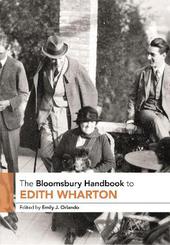
|
The Bloomsbury Handbook to Edith Wharton
Hardback
Main Details
Description
Bringing together leading voices from across the globe, The Bloomsbury Handbook to Edith Wharton represents state-of-the-art scholarship on the American writer Edith Wharton, once primarily known as a New York novelist. Focusing on Wharton's extensive body of work and renaissance across 21st-century popular culture, chapters consider: - Wharton in the context of queer studies, race studies, whiteness studies, age studies, disability studies, anthropological studies, and economics; - Wharton's achievements in genres for which she deserves to be better known: poetry, drama, the short story, and non-fiction prose; - Comparative studies with Christina Rossetti, Henry James, and Willa Cather; -The places and cultures Wharton documented in her writing, including France, Greece, Italy, and Morocco; - Wharton's work as a reader and writer and her intersections with film and the digital humanities. Book-ended by Dale Bauer and Elaine Showalter, and with a foreword by the Director and senior staff at The Mount, Wharton's historic Massachusetts home, the Handbook underscores Wharton's lasting impact for our new Gilded Age. It is an indispensable resource for readers interested in Wharton and 19th- and 20th-century literature and culture.
Author Biography
Emily J. Orlando is Professor of English and the E. Gerald Corrigan Chair in the Humanities and Social Sciences at Fairfield University, USA.
ReviewsBeautifully introduced by editor Emily J. Orlando, The Bloomsbury Handbook to Edith Wharton is an impressive volume underlining Wharton's extraordinary versatility and her remarkable ability to speak to our current moment. * Laura Rattray, Reader in American Literature, University of Glasgow, UK * Through invigorated theoretical frameworks that cross disciplines, Orlando's contributors effectively draw attention to the wide range of complexities and complications that Wharton's works reveal in both content and method. A multi-gifted Wharton shines brightly here. * Rita Bode, Department of English Literature, Trent University, Canada *
|